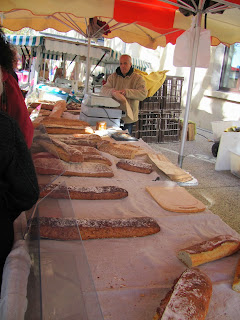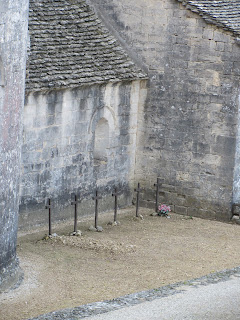We had breakfast this morning and then walked down
to the parking lot around the soccer field where the Friday morning market is
set up. Across the field we saw a herd of donkeys and beyond them the local chateau.
It is always interesting to see
what is in all the booths at the town markets. The first one
was roasting chickens, rabbits, duck, and pork in all permutations. They also were selling raw meats.
Next was a table of garlic.
Across the way were cheeses, then
tablecloths, flowers, sweaters, hats, scarves, coats, and even socks.
There were sausage merchants, seafood vendors (the fish market in Lourmarin recently closed), and another
selling olives,
but the one with the longest line was at the boulangerie. The baguettes were already sold out by 10:30 when we were there. I may have told you that the local baker has
taken November off, so there is no freshly baked bread in town. One of the little markets sells commercially
prepared bread, but it is just not the same.
The bread was sold by the kilo instead of by the loaf, and you could buy
a whole loaf, half a loaf, or any size at all.
Leon and I bought a half of a gigantic loaf of bread called campagne. It really just looked like a double sized
baguette.
We walked from one to the other with Leon sampling
some of the sausages. We bought some ham
for sandwiches, then realized that there was more of the market up some steps
into a town square. We found a little
booth that had a delightful lady who spoke no English, but she and I carried on
an interesting conversation by pointing and smiling. She had some homemade jams, and we bought a
jar of strawberry jam. I tried to talk
Leon into buying a beret, but he was not interested.
We came back to the apartment via a scenic route down a narrow path behind some houses.
There are lots of cats around these villages.
We spotted a pomegranate tree with pomegranates that had burst open on the tree.
We saw the local Protestant church,
went down more narrow paths, through a tunnel we had to stoop to walk through,
and came to the Catholic church.
and decided that we
needed to do a taste test of the bread and jam when we got back. I sliced off two thick
slices, toasted them, and slathered them with strawberry jam. Yum!
We were not disappointed.
Walter had made lists of places that we should
visit, so Leon got out the map and made an itinerary for our afternoon. We packed a picnic lunch with some roasted
chicken from the market, bread, chips, fruit, water, and cookies, and headed
out.
Our drive took us through the Luberon
Mountains. There are several mountain villages
that perch on the sides and tops of the mountains and are just
breathtaking. The first one we saw was
Bonnieux.
Helen took us on some interesting roads through the
mountains. Here is a photo of just one
section of the road. When we reached a hairpin
curve, she would tell us to “turn sharply” left or right.
Our drive continued on to Gordes, and there were un-harvested
olives all over the side of the road.
Most of them were green, but a few trees had ripe olives on them.
All along the road to Gordes we found really
fancy stone houses with big stone walls and fancy gates around them (down near the bottom of the photo).
Rick Steves says that Parisian big shots and
wealthy foreigners have purchased and restored older homes here putting
property values out of sight for locals.
Apparently villagers have found themselves with few affordable
options. The castle on the top was built
in the 11th century.
On the other side of Gordes is the Abbye Notre Dame
de Senanque. We drove down in the valley
to see it. It is a Cistercian Abbey
built in 1148 by a group of monks who wanted to get away from the excesses of
the Benedictine abbeys. The abbey here
is surrounded by fields of lavender tended and sold by the monks who are called
the “silent” monks because they have vows of silence. I told Leon I could never live there, and he
laughed and laughed. Imagine that! I had seen postcards in the local shops of lavender
fields in front of a church, but did not realize it is just down the road
(well, actually over the river, through the woods, over a mountain, and down in
the valley!).
Walter had also told us about the village of
Roussillon. It was once Europe’s capital
for ochre production until WWII, and most of the houses and shops are a reddish
or orange or yellow color. Even the
Romans appreciated Roussillon’s ocher and mined it. After WWII, less expensive substitutes have
been used, and ocher mining here has about ceased to exist.
There was some leftover snow on the sides of the
roads and in shady spots as we drove over the mountains. The distant mountains were very snowcapped.
Oh, I always take photo of roof tiles somewhere along the way. These looked fairly new, but were so interesting. Compare them to the roof tiles on the 12th century abbey.






































No comments:
Post a Comment